Warning: A non-numeric value encountered in /home/devndporg/public_html/plugins/system/helix3/core/helix3.php on line 490
Warning: A non-numeric value encountered in /home/devndporg/public_html/plugins/system/helix3/core/helix3.php on line 490
Warning: A non-numeric value encountered in /home/devndporg/public_html/plugins/system/helix3/core/helix3.php on line 490
Warning: A non-numeric value encountered in /home/devndporg/public_html/plugins/system/helix3/core/helix3.php on line 490
Warning: Use of undefined constant fals7e - assumed 'fals7e' (this will throw an Error in a future version of PHP) in /home/devndporg/public_html/components/com_cck/models/list.php on line 36
Factsheets

Quality Management Part 1: What is Quality Management?
In this first of two quality management factsheets we define what a quality service is, how quality management applies to disability service providers, the benefits of quality management and the purpose of quality systems.

Quality Management Part 2: How is Quality Measured?
In this facts heet we take a look at how quality is measured by service providers. Standards are agreed procedures or levels of performance against which service providers can assess themselves.

Tax And Super Changes To Let Your Employees Know About
On 1 July 2017, Federal Government changes to tax and super contributions will affect some employees. If you are a payroll administrator, here are some FAQs to assist you in addressing queries.

The online world of job platforms - coming to you in disability
This NDP fact sheet looks at job-matching websites. Hireup, Better Caring, Findacarer and Careseekers are some of the platforms that have arisen as a response to the NDIS and attract disability workers and service users. But applications like this have been operating in other parts of the labour market for some time.
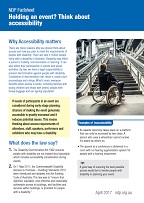
Holding an event? Think about accessibility
There are many reasons why you should think about access and how you plan to meet the requirements of people with disability. There are over 4 million people living with a disability in Australia. Disability may affect a person’s mobility, communication or learning. It can also affect their participation in events and social activities. We have a legal responsibility to prevent discrimination against people with disability.

Working in Non-Government Specialist Disability Services
Working in the non-government specialist disability services sector can be an incredibly rewarding experience. In this factsheet we explore the types of Non-Government Organisations (NGOs); the benefits of working for a NGO; and legislative entitlements for FACS staff transitioning to the NGO sector in 2017/18.
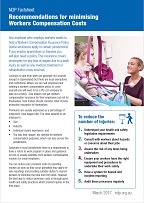
Recommendations for minimising Workers Compensation Costs
Any employer who employs workers needs to hold a Workers Compensation Insurance Policy (some exclusions apply in certain jurisdictions). If you employ apprentices or trainees you will also need a policy. This insurance covers employees for any loss of wages due to a work injury as well as any medical, treatment or rehabilitation costs incurred.
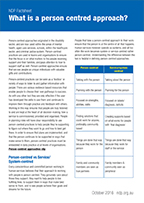
What are person centred approaches?
Person-centred approaches originated in the disability sector, and are now used within the areas of mental health, aged care services, schools, within the healthcare sector, and criminal justice system. Person-centred practices are used in teams and organisations to ensure that the focus is on what matters to the people receiving support and their families, and pays attention to how to support staff as well.
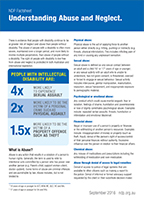
Understanding Abuse and Neglect
There is evidence that people with disability continue to be at greater risk of neglect and abuse than people without disability. The abuse of people with a disability is often more severe, maintained over a longer period, and more likely to involve multiple perpetrators, than abuse of people without disability.
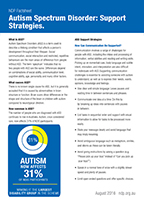
Autism Spectrum Disorder: Support Strategies
The number of people who are diagnosed with Autism Spectrum Disorders (ASD) continues to rise in Australia. Autism, once considered rare, now affects 31% of NDIS participant. Read more about ASD support strategies.






